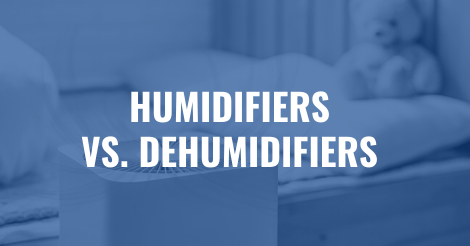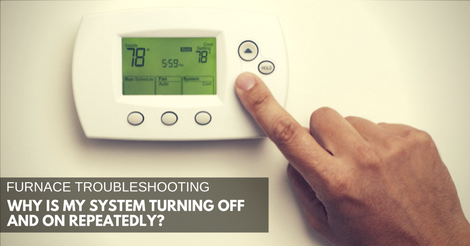Maintaining the right level of humidity in your home can be challenging. Throughout the year, depending on how dry or humid the air is, you may need to use a humidifier or dehumidifier for added comfort.
What is the difference?
Humidifiers add moisture to the air when it is too dry. Generally, people use humidifiers in the wintertime to combat the dryness of winter air.
A dehumidifier takes moisture out of the air when it is too humid. Dehumidifiers are used during the spring and summer. The two common reasons people use a dehumidifier is to control seasonal allergies and eliminate the sticky, stale feeling a house can have when humidity is high.
Which one should I buy?
The humidity in most homes is between 30% and 50%. If your home is above 50% humidity then a dehumidifier is needed. However, if humidity levels are below 30%, a humidifier is needed.
To determine the humidity level in your home pick up a hygrometer for less than $20 at a home improvement store.
How does humidity affect health?
Both systems help reduce ailments like chest congestion, allergies, and asthma. For example, a dehumidifier can help treat asthma that is triggered by humid air. Or, if you are suffering from a cold that has caused nasal passage blockage or sinus congestion, using a humidifier will help break that up.
How does humidity affect your home?
The way your home feels can also be used to determine what type of system you need for your home. If you experience dry itchy eyes, dry skin, and chapped lips then you need a humidifier. If there are damp stains on the ceilings or walls or if rooms feel stuffy then you need a dehumidifier.
Dry air can cause cracks on wood beams, plaster, and leather furniture. In this case, a humidifier would help.
Too much moisture in your home can lead to mold growing on walls and ceilings. This could lead to serious health problems. A dehumidifier prevents this from happening.
How does the weather affect indoor humidity?
In the summer, the air is naturally more humid causing it to get sticky and uncomfortable inside the home. In winter the air is dry and cold. Heaters compound the situation by removing most of the moisture in the house making it dry.
Humidity can also impact pest control. Carpenter ants, wood-destroying beetles, and termites are attracted to moisture.
If you have potted plants in your home, drier air means that you need to water them more often. However, moist air makes it easier for these plants to become infected with a disease.
Portable humidifiers and dehumidifiers work well but require a lot of upkeep and you may need to put several throughout your home. Burkholder’s HVAC offers an alternative solution, whole-home humidifiers, and dehumidifiers. These units are installed as part of your home’s heating or cooling system. The unit automatically controls and adjusts the humidity level in your home based on outdoor and indoor temperatures. With automatic control, you’ll always know what humidity level is in your home and enjoy peace of mind that it’s being maintained correctly.
To learn more about whole-home units or to request a free estimate, contact us.


